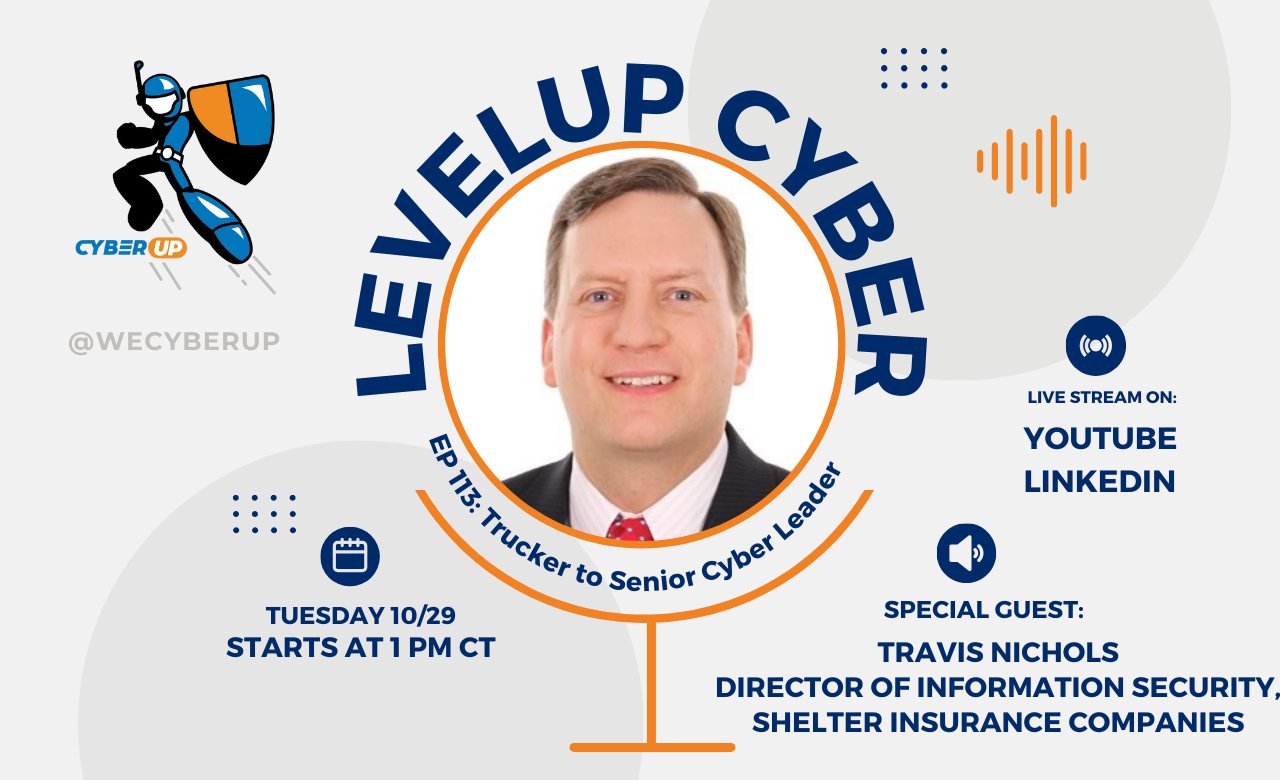-3.png)
Cy Says Blog & Podcast
-3.png)

Ep 116: Ask a CISO with Steve Zalewski

Apprentice Success Story: Elliott Thompson
Finding a New Path
Elliott Thompson had already spent years working in logistics management in the United States Air Force. His background was one of precision, coordination, and efficiency—traits crucial for the work he did daily. After his service, Elliott found himself facing a familiar question that many veterans experience: what's next? He held a Bachelor's degree in Management, which was certainly valuable, but he yearned for a new direction. He wanted something challenging, dynamic, and relevant to the evolving needs of today’s world. When Elliott discovered CyberUp, a program that provides accessible cybersecurity career pathways for veterans, he saw an opportunity to pivot toward a promising career in cybersecurity.
Elliott chose CyberUp not only because he was curious about cybersecurity but also because he needed a new career path—one that catered to his experience and the challenges of transitioning from military to civilian life. He valued that CyberUp’s programs specifically supported veterans, offering them a chance to not just retrain but to thrive through apprenticeships and hands-on opportunities.
Navigating the Transition
Elliott began his journey with CyberUp through their LevelUp Training program, immersing himself in the world of cybersecurity over the course of several months. The training helped him build foundational knowledge, and Elliott appreciated the structured approach it provided. He did, however, see room for more hands-on learning, suggesting that additional labs could be an excellent addition to the curriculum. His feedback was a testament to his desire to actively engage with every learning opportunity, eager to apply his skills practically, and make the most of his training.
Elliott’s determination paid off when he landed an apprenticeship at Centene Corporation as a reporting analyst. His new role focused on analyzing portfolio management processes and supporting budgeting decisions. For Elliott, it wasn’t just a new job—it was a place to bring together all the skills he’d developed: problem-solving from his Air Force days, data analysis from his training, and a desire to be a part of something bigger.
Challenges and Perseverance
The journey wasn’t always easy. Elliott faced a number of personal challenges while working to complete his required certification, an important milestone in his career progression. He experienced delays in taking the exam, both due to technical issues and personal circumstances. Despite these setbacks, Elliott remained focused, rescheduling his exam multiple times and even adjusting his plans to take the test closer to where his mother lived so he could balance his professional responsibilities with personal commitments. The process tested his patience, but it also underscored Elliott's resilience—a trait he had cultivated in the Air Force and now brought to his burgeoning cybersecurity career.
Throughout the apprenticeship, Elliott also had to navigate the challenge of proving his technical skills and establishing his place within his team. Initially, he encountered technical issues and struggled with integration, but he didn't let these challenges deter him. Instead, Elliott demonstrated his capabilities through consistent effort, engaging in all aspects of his role, and showing that he could adapt and grow.
Elliott's manager and team lead noticed his determination. Midway through the apprenticeship, discussions about extending his contract started to surface, and the possibility of being hired full-time became a realistic goal. Elliott worked hard to balance these expectations, his ongoing certification process, and the personal hurdles life threw his way. He learned that effective communication with his team was key—keeping them informed about the delays he was experiencing and managing expectations regarding his progress.
A Milestone Achievement
At the end of his apprenticeship, Elliott's persistence paid off when he was offered a full-time position with Centene. Reflecting on his journey, Elliott recognized the importance of not underestimating his own qualifications. He came to realize that the skills he had developed in the Air Force and during his apprenticeship were highly valuable, even if they weren't all purely technical. He learned that showcasing a wide range of skills—problem-solving, adaptability, teamwork—was just as critical as the technical knowledge he had worked so hard to build.
Paying It Forward
Elliott’s experience at CyberUp had a profound impact on his view of mentorship and community. He credits much of his success to the supportive network he built—mentors who offered guidance, teammates who provided encouragement, and a community that understood the unique challenges of transitioning to cybersecurity. Elliott decided that once his apprenticeship was over, he wanted to stay involved with CyberUp, offering mentorship to new apprentices. He believed that sharing his story, along with the lessons learned about perseverance, adaptability, and communication, could help others navigate their own paths.
He advises future apprentices to embrace every opportunity that comes their way, to stay involved, and to not give up when faced with difficulties. Building connections, Elliott says, is crucial—not just for professional opportunities but also for personal growth and support. He encourages apprentices to highlight the diversity of their experiences, understanding that technical skills are just part of what makes a great cybersecurity professional.
A New Future
Today, Elliott Thompson stands as a testament to the transformative power of CyberUp’s mission to create accessible career pathways. From his time in logistics management in the Air Force to becoming a full-time cybersecurity professional at Centene, Elliott’s story is one of resilience, adaptability, and growth. He’s a reminder that career transitions, while challenging, are entirely possible with the right support, dedication, and willingness to learn. As he looks toward the future, Elliott is committed to continuing his professional development, mentoring others, and helping to make the cybersecurity industry a place where everyone, regardless of their background, can find their place and thrive.
.png)
Ep 115: The Non-Technical Side of Cyber with Susan Klement

Apprentice Success Story: Isaac Parle
Isaac Parle’s journey into cybersecurity began with a drive to serve others through his work. He saw cybersecurity as a field with opportunities for learning and growth, and CyberUp’s apprenticeship program provided an entryway. With little technical experience at the start, Isaac committed to improvement. He used YouTube tutorials, study groups, and online resources to prepare for his first certification exam, Network+. CyberUp’s support helped him secure an apprenticeship in a company that encouraged both interaction and learning, even in a mostly remote environment. Between virtual trivia nights and Slack channels where coworkers connected, Isaac found himself part of a community that kept him engaged.
The company’s flexible approach allowed him to work remotely while also going into the office a few days each week, which helped him ease into his new role. This experience gave Isaac insights into how remote companies operate, and he learned early on the importance of work-life balance. To maintain a boundary between work and personal life, he adopted the habit of closing the door to his home office at the end of each day. To deepen his industry knowledge, he also followed cybersecurity news through newsletters, Reddit, and a cybersecurity Discord server.
Growing as an Apprentice
The first half of the apprenticeship came with personal challenges, including moments of self-doubt and imposter syndrome. Like many new to cybersecurity, Isaac sometimes questioned his place in the field. But his commitment to improvement and mentorship from CyberUp helped him push through. Reflecting on these moments, Isaac found that people skills and approachability helped him build relationships and gain insights from others on his team.
As Isaac progressed through his apprenticeship, his role expanded. Initially, he focused on help desk tasks, but as he gained skills, he began to support projects, configuring systems and handling integrations. Each assignment provided a chance to understand the field more deeply, and he gained confidence as he learned. By his sixth month, he had started working on system configurations, getting hands-on with cybersecurity operations.
Reaching a Milestone in the 12th Month
At the end of his apprenticeship, Isaac achieved a significant milestone: he was offered a full-time role as a junior systems administrator. This role brought more responsibilities, such as overseeing GitHub organizations and configuring systems. His path from help desk support to junior systems administrator reflects the growth he achieved during the apprenticeship and his commitment to learning at every stage.
Advice for Future CyberUp Apprentices
Looking back, Isaac shared advice for future apprentices entering CyberUp’s program. He noted that imposter syndrome is common, especially for those new to cybersecurity. He reminded aspiring professionals that everyone starts from the beginning, and while the field may seem daunting, perseverance and openness to learning make all the difference. He emphasized the value of people skills, saying that kindness and approachability help build good working relationships and lead to new learning opportunities.
He also found that a growth-oriented mindset was essential for overcoming challenges. Starting with little technical knowledge, Isaac built his skills gradually, proving that each step forward matters. His journey highlights that resilience and a dedication to learning are vital in cybersecurity.
Staying Involved and Looking Forward
Now a CyberUp alumnus, Isaac plans to stay connected with the community by joining the alumni network on LinkedIn and subscribing to the alumni newsletter. He sees this as a way to keep up with industry trends and improve his skills. Looking ahead, Isaac is ready to keep learning and make cybersecurity his lifelong career.
Isaac Parle’s story reflects the impact of CyberUp’s apprenticeship program. From a newcomer to a junior systems administrator, his journey shows the support and growth CyberUp fosters. As he continues in cybersecurity, Isaac’s experience will inspire others entering the field, showing them that with commitment and guidance, a promising future awaits.
-2.png)
Ep 114: Top 5 Cybersecurity Best Practices with James Bierly

The Scary Side of Ignoring Skills-Based Hiring
As we face rapid technological change and increasing job market demands, one thing has become clear: traditional hiring models are failing us. The workforce is shifting, industries are evolving, and yet, many companies continue to rely on outdated hiring practices that prioritize degrees over skills. The consequences of not embracing skills-based hiring are more frightening than we realize, with far-reaching impacts on businesses, employees, and the economy at large.
Here’s why ignoring this shift can create a real nightmare:
The Talent Shortage Will Worsen
One of the scariest outcomes of sticking to degree-based hiring is the growing talent gap. The cybersecurity industry is already facing a shortage of skilled professionals, with hundreds of thousands of unfilled jobs. Stubbornly clinging to old hiring methods creates artificial barriers that prevent qualified candidates from entering the workforce.
By excluding people who have the skills but not the degree, companies are shooting themselves in the foot. Ignoring these candidates means businesses will continue to struggle to fill key roles, leading to operational inefficiencies, vulnerabilities, and lost opportunities. The competition for top talent is fierce, and it’s not just about fighting over those with a traditional background—it’s about looking beyond that, or risk falling behind.
Missed Innovation and Agility
In an era where adaptability is key, failing to embrace skills-based hiring means missing out on a diverse, innovative workforce. Companies that focus only on candidates with degrees from specific institutions miss the unique perspectives and problem-solving approaches that come from individuals with nontraditional backgrounds.
Skills-based hiring opens the door to a wide range of talent, including self-taught professionals, career changers, and those from marginalized communities who may not have had access to formal education but have gained skills through other means. When we ignore this talent, we stifle innovation, limit agility, and risk becoming irrelevant in a rapidly changing landscape.
Economic Disparity Will Widen
Skills-based hiring can play a major role in addressing inequality by opening opportunities for individuals from underrepresented and marginalized communities. However, if businesses fail to adopt this approach, the economic divide will only continue to widen.
The reliance on degree-based hiring perpetuates systemic barriers that limit upward mobility for many individuals. Those who cannot afford traditional education are left behind, even if they possess the skills to do the job. By not shifting our focus to what people *can do* versus what paper they hold, we contribute to an economic system that benefits the few at the expense of the many.
Business Vulnerabilities Increase
The reluctance to adopt a skills-based hiring model also increases the risk of hiring underqualified individuals. While a degree may suggest a certain level of knowledge, it doesn’t guarantee the skills needed to perform well in a specific role. When companies default to degree requirements without verifying hands-on abilities, they run the risk of employing people who are not fully prepared to meet the demands of the job.
On the flip side, there are countless individuals who possess the technical skills and real-world experience needed for a job, yet their lack of formal education keeps them from getting a foot in the door. The result? Businesses are left with critical skills gaps and higher turnover rates, all while passing over the very candidates who could have filled those gaps.
Future-Proofing Requires Adaptation
Finally, ignoring skills-based hiring puts businesses in a dangerous position in the long term. The future of work is shifting towards automation, AI, and the digital transformation of industries. Companies that are unwilling to adapt their hiring practices to focus on the skills required to navigate this new landscape will find themselves outpaced by competitors who do.
The future belongs to those who can adapt, learn new skills, and keep up with the demands of the market. If we don’t embrace skills-based hiring, we are choosing to cling to an outdated model that will leave us woefully unprepared for the future.
A Call to Action
The scary truth is that the consequences of ignoring skills-based hiring are already being felt. Companies struggling to find talent, growing economic inequality, and missed innovation opportunities are just the beginning. We must take this shift seriously and reevaluate how we approach talent acquisition. The world is changing, and our hiring practices must change with it, or we risk being left behind in an increasingly competitive and uncertain market.
Now is the time to embrace the model and unlock the potential of a broader, more diverse workforce—before it’s too late.

Ep 113: Trucker to Senior Cyber Leader with Travis Nichols
-4.png)
Ep 112: Understanding Security Awareness with Tom Kirkham
.png)
Arctic Wolf supports cybersecurity training cohort with CyberUp
October 23, 2024
St. Louis, MO – CyberUp, a nonprofit organization dedicated to closing the cybersecurity skills gap, is excited to announce Arctic Wolf, a global leader in security operations, as the official sponsor of its current cybersecurity training cohort. This collaboration emphasizes Arctic Wolf's commitment to fostering new talent in the cybersecurity industry and addressing the growing demand for skilled professionals in this critical field.
CyberUp's training program provides individuals from diverse backgrounds with hands-on experience, mentorship, and certifications needed to launch successful careers in cybersecurity. Thanks to Arctic Wolf's sponsorship, this cohort will benefit from additional resources, guidance, and exposure to cutting-edge security technologies.
“We are thrilled to have Arctic Wolf on board as our latest sponsor,” said Tony Bryan, Executive Director of CyberUp. “Their support enables us to provide high-quality training to our participants and continue our mission of bridging the skills gap in cybersecurity.”
“At Arctic Wolf, we believe in supporting the next generation of cybersecurity professionals,” said Mark Manglicmot, Senior Vice President, Security Services, Arctic Wolf. “CyberUp’s training program aligns perfectly with our goal of building a stronger, more resilient security community, and we’re proud to be part of this impactful initiative.”
This partnership reflects a shared vision between Arctic Wolf and CyberUp to expand opportunities for aspiring cybersecurity professionals and to ensure that businesses across the nation have access to the skilled talent they need to combat today’s evolving cyber threats.
About CyberUp
CyberUp is a non-profit organization dedicated to elevating the cybersecurity workforce by igniting curiosity, developing talent, and transforming career pathways. For more information, visit https://wecyberup.org.
